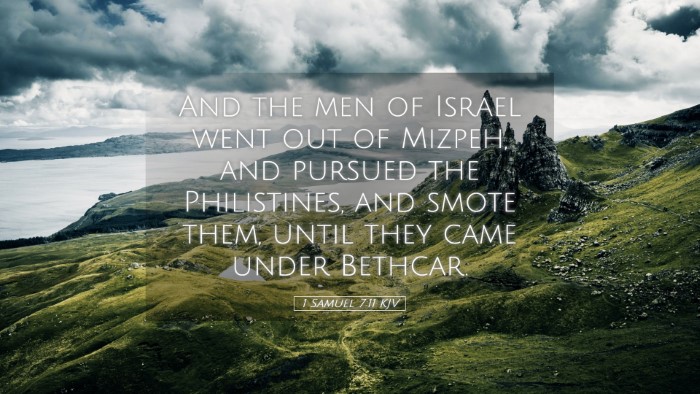Commentary on 1 Samuel 7:11
In this significant verse, we witness a pivotal moment in the history of Israel as the people respond to the spiritual leadership of Samuel. The actions of the Israelites during this time convey profound lessons for pastors, scholars, and believers engaged in the life of faith.
Contextual Overview
1 Samuel 7:11 reads, "And the men of Israel went out of Mizpeh, and pursued the Philistines, and smote them until they came under Beth-car." This moment follows a period of repentance and reformation under Samuel's leadership. After the Israelites had turned back to the Lord, they were empowered to confront their enemies.
Historical Background
-
Philistine Oppression: The Philistines were a persistent threat to Israel, capturing the ark of the covenant and defeating Israel in several battles. The events leading to this battle reveal the dire state of Israel before rallying under Samuel’s guidance.
-
Spiritual Renewal: The people sought the Lord and fasted, leading to a revival that emphasized the collective need for a return to covenant faithfulness. Samuel’s leadership played a crucial role in this transformation.
Theological Implications
This verse encapsulates themes of divine deliverance and human responsibility. The Israelites' courageous pursuit of the Philistines underlines the necessity of active faith in the face of adversity.
1. Divine Empowerment
Commentaries emphasize that it was the Lord who enabled Israel to defeat the Philistines. Samuel had called the people to repentance, and upon their fidelity to God, divine assistance became manifest. As highlighted by Albert Barnes, the victories achieved were not merely by military might but through the providence and intervention of God.
2. Collective Action
The pursuit of the Philistines was a united front. This corporate action reflected their solidarity and obedience to God. Matthew Henry points out that unity among God’s people is vital in spiritual warfare. The Israelites demonstrate that individual spiritual vitality often translates into communal strength and victory.
3. The Role of Leadership
Samuel’s role as a spiritual leader is noteworthy. His example showcases the impact of godly leadership in the spiritual and temporal realms. Adam Clarke suggests that leaders must guide their people back to God, emphasizing repentance as an essential precursor to victory and renewal within the community.
Contemporary Application
The implications of 1 Samuel 7:11 are timeless. For pastors and theologians today, the themes of repentance, divine aid, and the value of sound leadership resonate deeply within congregational and communal life.
Repentance as Precursor
Just as the Israelites turned back to God with sincerity, modern believers must recognize the need for ongoing repentance. Effective ministry often requires a call back to foundational truths and obedience to God. This verse serves as a reminder of the spiritual warfare that accompanies the Christian journey.
Unity in Action
The collective action of the Israelites prompts the church today to pursue unity in mission. Emphasizing community efforts in confronting modern challenges enhances the church’s witness. Collaboration in the pursuit of holiness and godliness shapes a powerful testimony to the world.
Leadership Responsibilities
Modern leaders are called to emulate Samuel’s model of accountability and faithfulness. The church's effectiveness hinges on leaders who encourage repentance and foster an environment where the congregation can respond to God’s call. Training new leaders in these virtues ensures the continuation of spiritual vitality.
Concluding Thoughts
1 Samuel 7:11 serves as both a narrative of historical significance and a timeless exhortation. It speaks of God’s grace in times of crisis, the power of a unified people, and the crucial role of leadership that collects and directs the community towards divine purposes. As pastors, students, and scholars reflect upon this verse, they are urged to impart these truths within their ministries and studies, drawing continually from the well of biblical wisdom.


